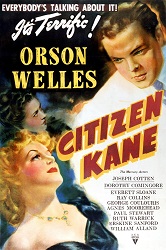Review of 'Citizen Kane'
 Citizen Kane opens with the death of multi-millionaire Charles Foster Kane (Orson Welles) whose life is told in a brief newsreel. The editor watching the film realises that while it talks about the details of Kane's life it does not provide any details of the man's character such as the meaning of his final words: “Rosebud”. He agrees to delay releasing the newsreel sending newsman Thompson (William Alland) to investigate beginning with a visit to the Walter Thatcher library where they read Kane's banker Walter Thatcher's (George Coulouris) papers. Kane inherits the world's third largest gold mine and Thatcher is made his guardian. When Kane finally comes of age he decides to run the small “New York Daily Inquirer” newspaper rather than a mine seeking to “speak up for the underprivileged” though despite this the paper loses $1 million a year and is eventually sold. The next interview with Kane's general manager Bernstein (Everett Sloane) reveals that Kane was never really interested in making money. He tells of how Kane poaches the entire editorial staff of the New York Chronicle for his Inquirer then of his trips to Europe where he sends back large amounts of priceless art returning engaged to the president's niece Emily Norton (Ruth Warrick). In a subsequent interview with Kane's life-long friend Jedediah Leland (Joseph Cotten) we learn this marriage eventually sours though results in the birth of a son. Emily wants more from Kane but Kane is obsessed with the paper and his collecting. Kane becomes fascinated by the personality and voice of a music shop employee, Susan Alexander (Dorothy Comingore) which eventually causes the end of his political aspirations, the breakup of his first marriage and his building of an opera house for Susan. Her vocal talents were only ever seen by Kane who seems determined to see her succeed regardless of reality. Kane refuses to accept this even after Jeb writes a horrible review for Kane's Chicago paper. Kane's relentlessness eventually results in Susan overdosing on pills then being bored in the mansion, Xanadu, that he builds for her. As we learn more and more of Kane's tragic life we appear to be no where nearer to learning what “Rosebud” means…
Citizen Kane opens with the death of multi-millionaire Charles Foster Kane (Orson Welles) whose life is told in a brief newsreel. The editor watching the film realises that while it talks about the details of Kane's life it does not provide any details of the man's character such as the meaning of his final words: “Rosebud”. He agrees to delay releasing the newsreel sending newsman Thompson (William Alland) to investigate beginning with a visit to the Walter Thatcher library where they read Kane's banker Walter Thatcher's (George Coulouris) papers. Kane inherits the world's third largest gold mine and Thatcher is made his guardian. When Kane finally comes of age he decides to run the small “New York Daily Inquirer” newspaper rather than a mine seeking to “speak up for the underprivileged” though despite this the paper loses $1 million a year and is eventually sold. The next interview with Kane's general manager Bernstein (Everett Sloane) reveals that Kane was never really interested in making money. He tells of how Kane poaches the entire editorial staff of the New York Chronicle for his Inquirer then of his trips to Europe where he sends back large amounts of priceless art returning engaged to the president's niece Emily Norton (Ruth Warrick). In a subsequent interview with Kane's life-long friend Jedediah Leland (Joseph Cotten) we learn this marriage eventually sours though results in the birth of a son. Emily wants more from Kane but Kane is obsessed with the paper and his collecting. Kane becomes fascinated by the personality and voice of a music shop employee, Susan Alexander (Dorothy Comingore) which eventually causes the end of his political aspirations, the breakup of his first marriage and his building of an opera house for Susan. Her vocal talents were only ever seen by Kane who seems determined to see her succeed regardless of reality. Kane refuses to accept this even after Jeb writes a horrible review for Kane's Chicago paper. Kane's relentlessness eventually results in Susan overdosing on pills then being bored in the mansion, Xanadu, that he builds for her. As we learn more and more of Kane's tragic life we appear to be no where nearer to learning what “Rosebud” means…
A cinema classic from the great Orson Welles, with Citizen Kane being his masterpiece. Welles manages to bring bring the cryptic Kane character to life on the screen through use of dramatic cinematography and lighting. Even in black and white it simply looks amazing. It also sounds amazing with a full orchestral score by Bernard Herrmann.
The acting is first rate with Welles himself compelling as the often ruthless Kane never really revealing what he actually feels. The rest of the cast is full of characters that are far more human, and frail, than Kane, but characters with not an incredible amount of depth. Indeed this film appears to be full of more questions posed by it's characters than of answers and we are left not entirely sure, though perhaps as a result of the narrative device of telling the story from the perspective of different people? In any case, this uncertainty is unusual for a Hollywood picture. There has obviously been a lot of thought given to both the story and the filming of “Citizen Kane”.
This is not exactly a “fun” film but it is certainly interesting and looks great. The story is compelling but do not expect to get all of the answers given to you on a plate…(though perhaps the “Rosebud” thing).
Rating: “Nearly perfect, but not quite”
Review Date: 2020-01-05
Directed by: Orson Welles
Studio: RKO Radio Pictures
Year: 1941
Length: 119 minutes
Genre: Melodrama
https://www.imdb.com/title/tt0033467/